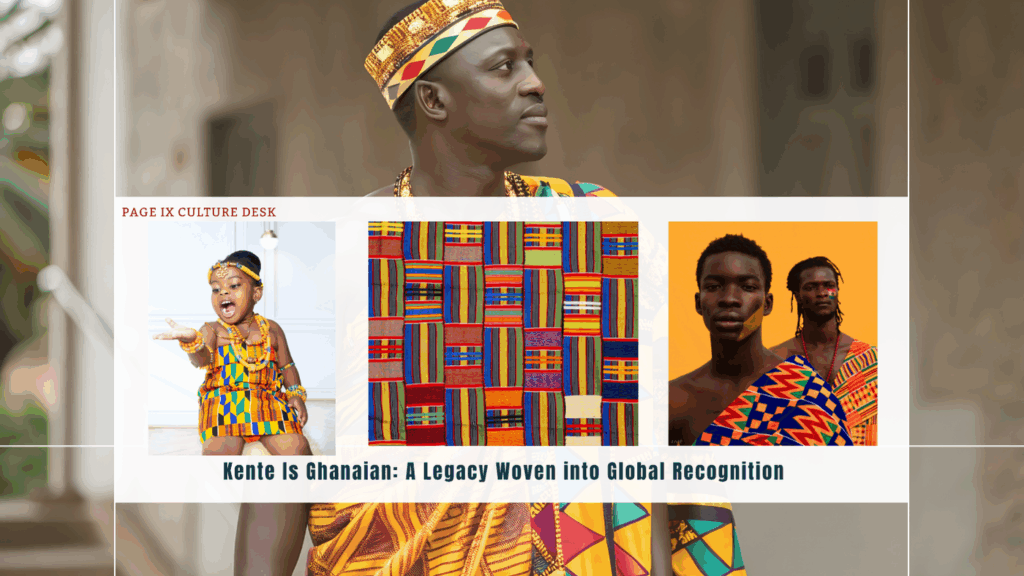
In October 2025, Ghana secured a historic victory—not through war or diplomacy, but through the loom. The iconic Kente cloth, long revered across West Africa and the diaspora, was officially granted Geographical Indication (GI) status under the United Nations framework. This means that only cloth woven in designated Ghanaian communities—especially Bonwire, the ancestral home of Kente—can be marketed globally as authentic Kente.
The event was hosted by the Registrar General’s Department of Ghana, in partnership with the World Intellectual Property Organization (WIPO). In attendance were master weavers from Bonwire and Adanwomase—the ancestral homes of Kente—alongside government officials, cultural historians, and international delegates. Among them stood Hon. Joseph Owusu, Ghana’s Registrar-General, who declared the certification not just a legal achievement, but a cultural restoration.
This is more than a legal win. It’s a cultural reckoning. A reclamation. A stitch in the long tapestry of African identity.
The Fabric That Speaks
Kente is not just cloth. It is language, memory, and power. Each pattern tells a story, and each color carries meaning: gold for royalty, blue for harmony, green for renewal, and black for spiritual strength. Woven by hand and passed down through generations, Kente is the heartbeat of Ghanaian heritage.
Its origins trace back to the 17th-century Ashanti Kingdom, where legend says two men—Ota Karaban and Kwaku Ameyaw—learned the art of weaving by watching a spider spin its web. From that moment, Bonwire became the cradle of Kente, and the cloth became sacred—worn by kings, queens, and elders during ceremonies of birth, death, and nationhood.
The journey to GI certification was meticulous. Ghana’s legal team, supported by WIPO experts, mapped the traditional weaving zones and documented the cultural, historical, and economic significance of Kente. Standards were established to ensure that only handwoven cloth from designated communities could bear the GI label. Training sessions were held for weavers and traders, empowering them to navigate the global market with new tools of legitimacy.
While the official catalogue number remains archived within Ghana’s national GI registry and WIPO’s international database, the registration now places Kente alongside globally protected heritage products like Champagne (France), Tequila (Mexico), and Darjeeling Tea (India).
Kwame Nkrumah, The Man Who Wore A Nation
While Kente was always revered in Ghana, it was Kwame Nkrumah, Ghana’s first president, who made it a global symbol. In the 1950s and ’60s, Nkrumah wore Kente during independence celebrations, diplomatic visits, and speeches to the United Nations. His choice was deliberate: to show the world that Africa was not a continent of poverty, but of pride, power, and heritage.
Nkrumah’s Kente became a visual manifesto. It inspired other African leaders, artists, and activists—from Miriam Makeba to the Black Panther Party—to embrace traditional textiles as symbols of resistance and identity.
The Geographical Indication (GI) granted by the World Intellectual Property Organization (WIPO) places Kente alongside global heritage products like Champagne (France) and Darjeeling tea (India). This recognition:
Protects authenticity: Only Ghanaian-made Kente can be labeled and sold as such.
Prevents cultural appropriation: Mass-produced imitations from abroad can no longer claim the name.
Boosts local economies: Weavers, dyers, and traders in Ghana gain access to premium markets.
Preserves tradition: GI status encourages intergenerational transmission of weaving skills.
It’s a win not just for Ghana, but for African cultural sovereignty.
This moment invites other African Nations to follow suit; Nigeria’s Aso Oke, Kenya’s Kikoi, Mali’s Bogolanfini (mud cloth), Ethiopia’s Shemma, since each textile carries centuries of meaning. Each deserves protection and pride.
Kente’s recognition is a blueprint. It shows that African heritage is not just beautiful—it’s valuable. It can be protected, monetized, and elevated on the world stage without losing its sou